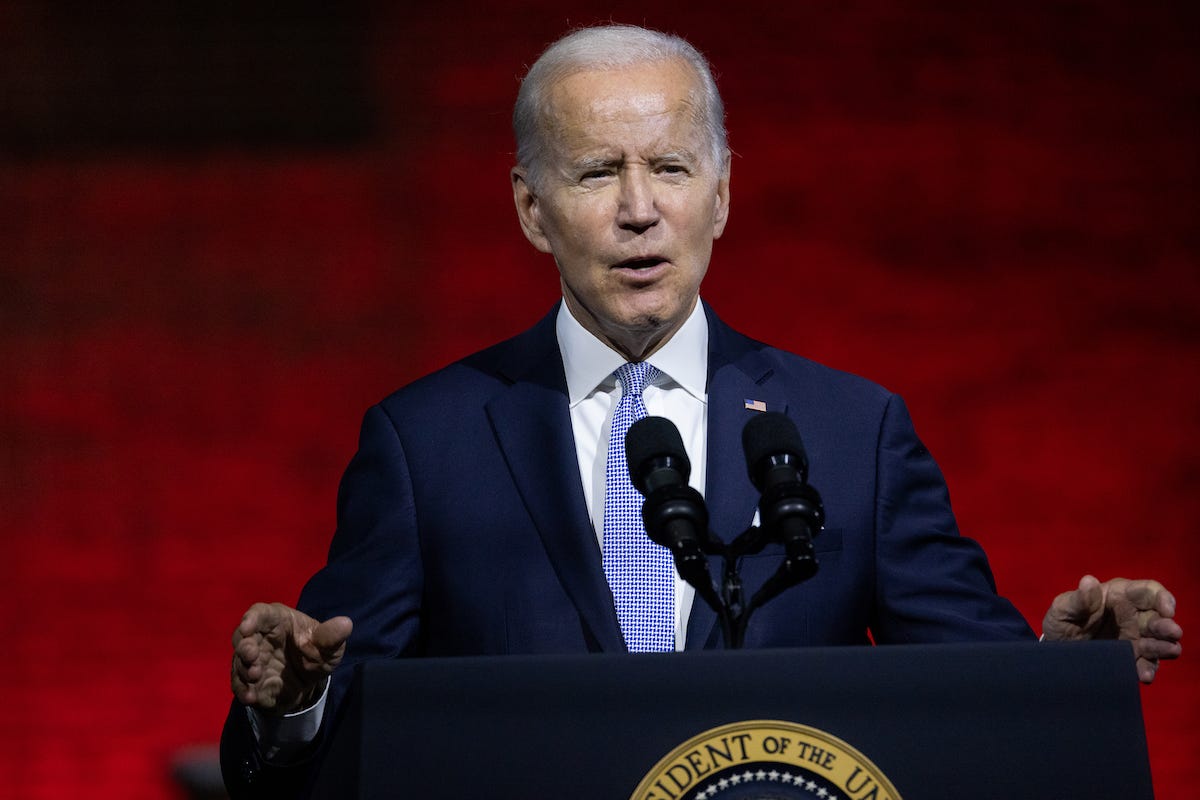How To Reanimate The Democracy Fight
Democrats could use sharper rhetoric and journalists could use defter questions to keep the issue from growing stale and letting Republicans get away with insurrection.
One of the reasons I think Donald Trump is bluffing about wanting to debate Joe Biden (“any time, any place,” he insists) is that he’s never attempted one of his awkward, dishonest “pivots” to soften one of his wort issues: his pathological lying about the 2020 election.
Trump will implausibly insist he poses no threat to Social Security and Medicare. He will laughably pretend women have nothing to fear from his administration, because, with Roe overturned, the issue of reproductive rights is already settled.
But he won’t drop the Big Lie.
With all the harm he visited on the nation since losing four years ago, he couldn’t easily walk away from his assault on democracy if he wanted, but his narcissistic ego won’t let him try. Trump could simply stop lying, call the past the past, and hope to defuse the issue just a bit. It just doesn’t seem to be within his psychic ambit.
Years in, though, the discourse around the Big Lie—by which I mean the specific language political elites use to discuss it—has grown a bit stale, in a way that helps Trump. Democrats haven’t touched up their democracy rhetoric in a long time. Trump typically interacts only with allied media, where the Big Lie is gospel. When he ventures into the mainstream press, he faces the same set of questions, gives the same answers, endures a brief fact-checking on a good day, and then everyone moves on.
His surrogates now routinely face questions about whether they’ll accept the results of the 2024 election, and they all echo some version of Trump’s contingent line: If there’s no cheating—which they define to mean “if Trump wins”—then, yes, they’ll accept the results. His allies in Congress will waste time on propaganda legislation they claim will make it a crime for “illegals” to vote—something that is already against the law and basically never happens.
These are vexing dodges for reporters and Democrats, because exposing the underlying bad faith requires some depth of explanation and repetition. (I suspect this, more than any polling, is why outlets like the New York Times has relegated democracy to the third-tier of issues—it’s old news, and therefore boring.) There has never been the kind of cheating in elections that Republicans insist they are on guard against. Cheating of the kind Republicans decry in bad faith is rare, and easily uncovered, and the cheaters are generally Republican voters anyhow. As for Democrats: Who wants to get caught voting against legislation to keep ineligible people from casting ballots, even if it is redundant, bigoted scapegoating?
A real debate between Trump and Biden would make these dodges less availing. But until it happens, I think it’s time to unsettle these patterns, so that Republicans can’t dodge so easily, and so people stop tuning out the controversy as though it’s been settled.
COUP CAN PLAY AT THIS GAME
Biden’s go-to rhetoric is reasonably effective. He calls Trump “the defeated former president” and claims the mantle of patriotism in chastising Trump’s enablers: “you can’t love your country only when you win.”
These are good lines, tough but high-minded, and distinctly statesmanlike. They’re what you’d expect a president in Biden’s predicament to say to appeal both to people who remain angry about Trump’s failed coup and to those whose anger has waned or who’ve moved on.
I don’t think Biden needs to retire them, but there’s more he could say, and more that a rhetorically sharp politician would say, to drive the import home.


